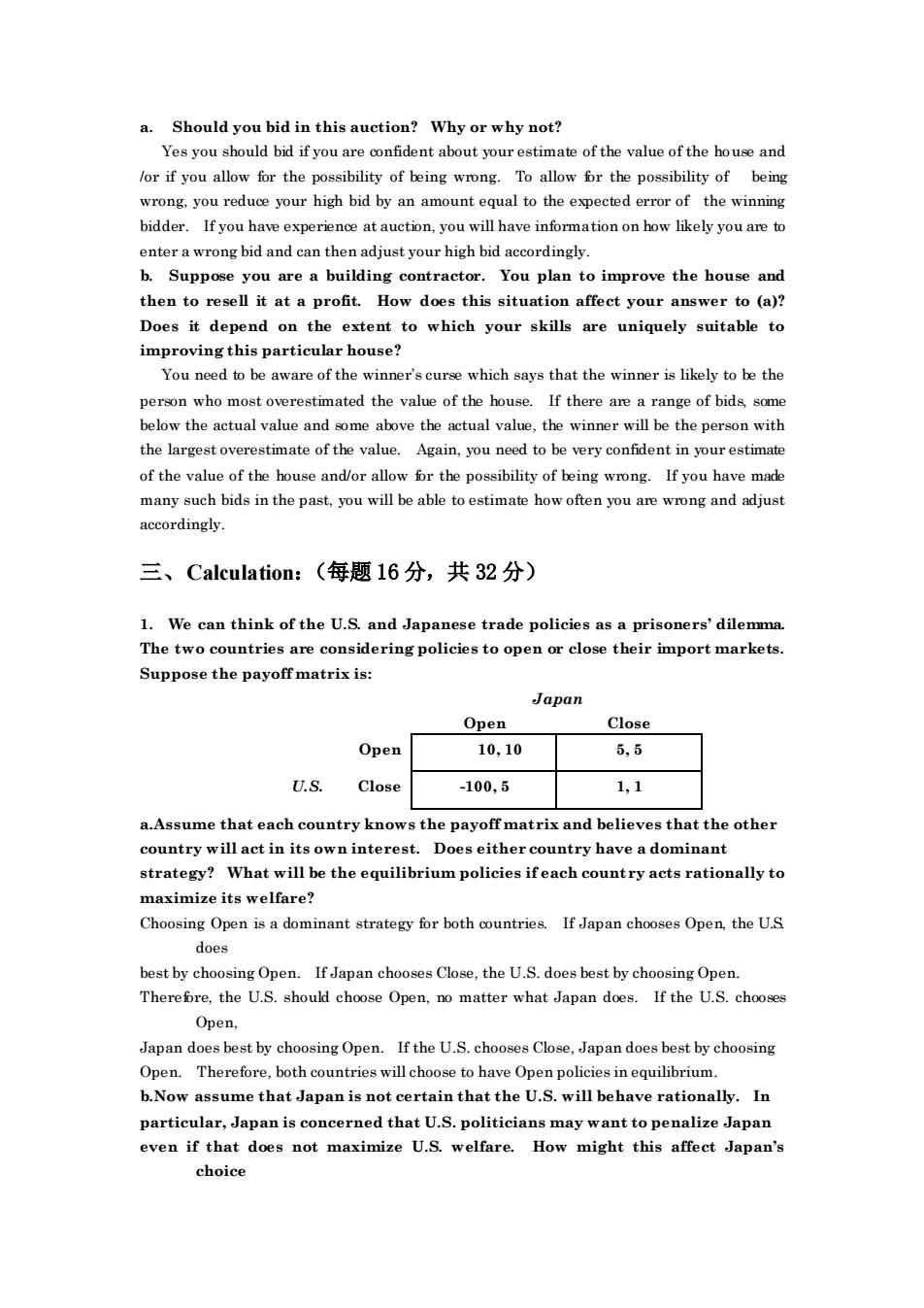正在加载图片...

Should you bid in this auction?Why or why not? Yes you should bid if you are confident about yourestimate of the value of the house and /or if you allow for the possibility of being wrong.To allow fr the possibility of being wrong,you reduce your high bid by an amount equal to the expected error of the winning bidder.If you have you will have information on ow likely youre enterawrong bid and can thenadjust your high bid accordingly. b.Suppose you are a building contractor.You plan to improve the house and then to resell it at a profit.How does this situation affect your answer to (a)? Does it depend on the extent to which your skills are uniquely suitable to improving this particular house? You need to be aware of the winner's curse which says that the winner is likely to be the person who most overestimated the value of the house.If there are a range of bids,some below the actual value and ome above the actual value,the winner will be the person with the largest overe estimate of the value.Again,you need to be very confident in yourestim of the value of the house and/or allow for the possibility of being wrong.If you have made many such bids in the past,you will be able to estimate how often you are wrng and adjust accordingly 三、Calculation:(每题16分,共32分) 1.We can think of the U.S.and Japanese trade policies as a prisoners'dilemma The two co untries are considering policies to open or close their t import markets Suppose the payoff matrix is JJapan Open Close Open 10,10 5,5 U.S. Close -100.5 1,1 a.Assume that each country knows the payoff matris and believes that the other untry will act in it own inter Does ith count try have a d min ant strategy?What will be the equilibrium policies ifeach country acts rationally to maximize its welfare? Choosing Open is a dominant strategy for both countries.If Japan chooses Open the US best by choosing Open.If Japan chooses Close,the U.S.does best by choosing Open. Therefore.the U.S.should choose Open.no matter what Japan does.If the U.S.chooses Open. Japan does best by choosing Open.If the U.S.chooses Close,Japan does best by choosing Open.Therefore,both countries will choose to have Open policies inequilibrium b.Now assume that Japan is not certain that the U.S.will behave rationally.In particular.Japan is concerned that U.S.politicians may want to penalize Japan even if that does not maximize U.S.welfare.How might this affect Japan's choicea. Should you bid in this auction? Why or why not? Yes you should bid if you are confident about your estimate of the value of the house and /or if you allow for the possibility of being wrong. To allow for the possibility of being wrong, you reduce your high bid by an amount equal to the expected error of the winning bidder. If you have experience at auction, you will have information on how likely you are to enter a wrong bid and can then adjust your high bid accordingly. b. Suppose you are a building contractor. You plan to improve the house and then to resell it at a profit. How does this situation affect your answer to (a)? Does it depend on the extent to which your skills are uniquely suitable to improving this particular house? You need to be aware of the winner’s curse which says that the winner is likely to be the person who most overestimated the value of the house. If there are a range of bids, some below the actual value and some above the actual value, the winner will be the person with the largest overestimate of the value. Again, you need to be very confident in your estimate of the value of the house and/or allow for the possibility of being wrong. If you have made many such bids in the past, you will be able to estimate how often you are wrong and adjust accordingly. 三、Calculation:(每题 16 分,共 32 分) 1. We can think of the U.S. and Japanese trade policies as a prisoners’ dilemma. The two countries are considering policies to open or close their import markets. Suppose the payoff matrix is: Japan Open Close Open 10, 10 5, 5 U.S. Close -100, 5 1, 1 a.Assume that each country knows the payoff matrix and believes that the other country will act in its own interest. Does either country have a dominant strategy? What will be the equilibrium policies if each country acts rationally to maximize its welfare? Choosing Open is a dominant strategy for both countries. If Japan chooses Open, the U.S. does best by choosing Open. If Japan chooses Close, the U.S. does best by choosing Open. Therefore, the U.S. should choose Open, no matter what Japan does. If the U.S. chooses Open, Japan does best by choosing Open. If the U.S. chooses Close, Japan does best by choosing Open. Therefore, both countries will choose to have Open policies in equilibrium. b.Now assume that Japan is not certain that the U.S. will behave rationally. In particular, Japan is concerned that U.S. politicians may want to penalize Japan even if that does not maximize U.S. welfare. How might this affect Japan’s choice